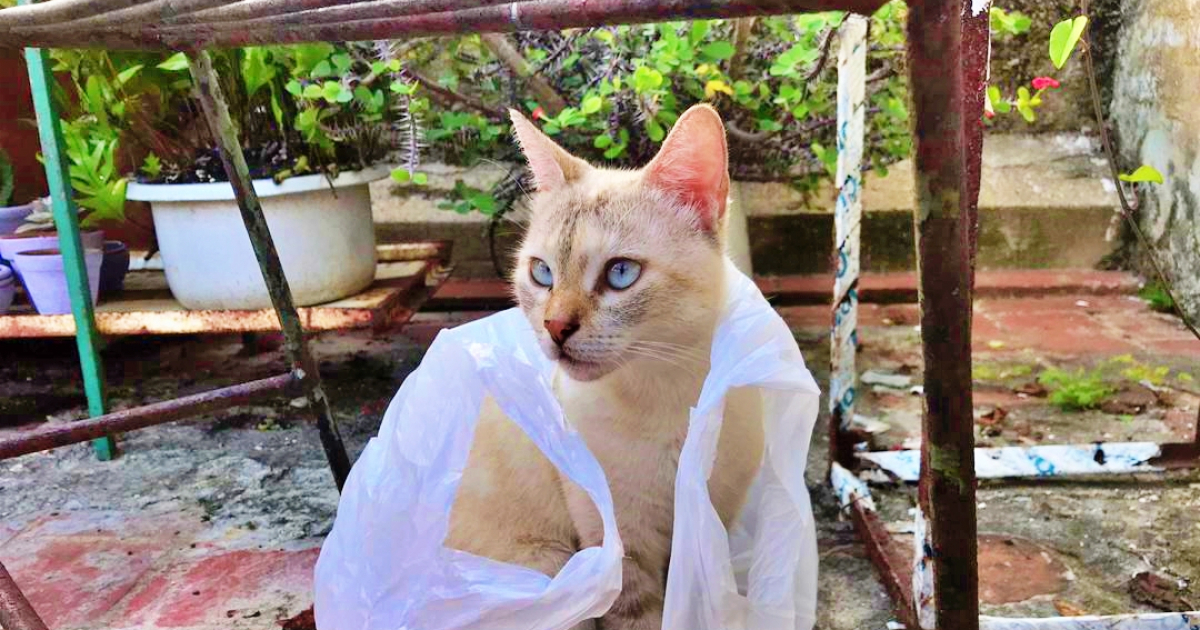The worsening economic crisis in Cuba has led to unusual acts, such as the hunting of dogs and cats for consumption. This has alarmed animal rights advocates who highlight the lack of protection for pets in a country with lax anti-cruelty laws.
The multimedia platform El Toque published an extensive journalistic piece revealing how cat consumption has increased in the province of Guantánamo. "The normalization of these acts has caused concern, especially among animal protection societies in the province and pet owners," the website noted, warning that some people fear for their pets' lives and prefer to keep them indoors for protection.
This article covers topics related to the abuse and consumption of domestic animals in Cuba. Some descriptions may be disturbing to certain readers, especially those sensitive to animal cruelty. Viewer discretion is advised.
Mayte, a member of Bienestar Animal Cuba (BAC), explained that she does not let her cats go outside due to fear of theft, choosing to keep them safe indoors. She stated that this is currently the only way to keep pets safe in Guantánamo.
The promotion of cat meat sales on social media, coupled with the lack of action from legal and health authorities, has caused outrage and concern among animal advocates and other residents of the province.
Additionally, the surge in people hunting, stealing, and consuming companion animals in Cuba is alarming, reflecting the severity of the economic crisis, particularly in vulnerable areas, El Toque pointed out.
Hunting and Selling Cat Meat: A Growing Concern
The website reported that neighborhoods such as “La Loma del Chivo,” “El Bayamo,” and “Polvo en el Viento” in Guantánamo are known hubs for the theft and sale of cats, as well as their consumption.
A young man who has been involved in the hunting and sale of cat meat for many years told the cited website that this practice has increased in Guantánamo due to “the economic impossibility of accessing other protein sources.”
Speaking anonymously, he shared that his neighbors, sharing the same poverty, started placing orders once they learned of his activities.
He noted that cat meat is also sold in Guantánamo due to the popular belief that soup made from a cat's head has healing properties for neurological diseases and arthritis, a practice passed down through generations.
Until a few months ago, cat meat was sold secretly, but by late February 2024, explicit ads for its sale went viral on Guantánamo’s social media, revealing the real presence of this practice in the province.
“Cat meat and its consumers reflect the food shortages that the Cuban people suffer and the desperate alternatives they find in the face of hunger. However, the desperate measure, far from being a solution, generates significant problems,” El Toque noted.
Besides being a taboo food due to their status as companion animals, consuming cat meat poses health risks since felines can carry toxoplasmosis, rabies, and parasitic diseases transmissible to humans.
The issue is a major concern for animal advocates, who consider Decree Law 31/2021 (Animal Welfare Law) to be "a dead letter" due to insufficient sanctions and ineffective regulations, as evidenced by constant reports of animal abuse on social media.
For instance, the organization Cubanos en Defensa de los Animales (CEDA) called on Facebook this Wednesday for people to report any advertising, commercial, or suspicious activity involving animals.
“Let's do everything in our power to stop this barbarity and ensure it is not normalized in any way. Report, use the mechanisms in our power until exhaustion,” they urged.
Last April, the regime could not hide an incident of this nature that occurred in the province of Mayabeque.
The Cuban government addressed the publications circulating on social media about the slaughter of dogs to sell their meat in some areas of the province.
An informative note signed by the Ministry of Agriculture referred to acts against animal welfare that occurred in the municipality of San José de las Lajas, Mayabeque, which caught the authorities' attention due to their dissemination on social media.
Cubans who bought that meat and activists from the province of Mayabeque filed a formal complaint with the authorities against those involved in the slaughter of these animals for sale.
FAQs about Animal Consumption in Cuba
In light of the alarming rise in the hunting and consumption of domestic animals in Cuba, we've compiled some frequently asked questions to provide more insights into this serious issue.
Why has cat consumption increased in Guantánamo?
The increase in cat consumption in Guantánamo is largely due to the economic crisis, which has made it difficult for people to access other sources of protein.
What are the health risks associated with eating cat meat?
Consuming cat meat poses health risks as cats can carry diseases like toxoplasmosis, rabies, and various parasitic diseases that are transmissible to humans.
What actions are animal rights advocates taking?
Animal rights advocates are urging people to report any suspicious activities involving animals and are calling for stricter enforcement of animal welfare laws.
